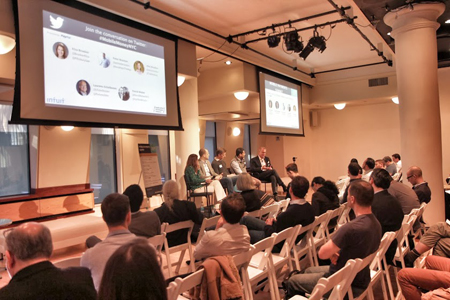When considering how to maximize the impact of your event, make sure not to overlook how your venue can help. While choosing a venue often takes a backseat when it comes to planning your event, a great venue can offer a lot of value, beyond the items listed on the invoice.
Meet Somewhere Exciting!
Meetings and conferences have long been held at traditional venues like hotel conference centers or ballrooms, but that doesn’t mean that your next event should be. Increasingly, meeting participants expect to see exciting content and surprising, unique elements at events that get the creative juices flowing and keep guests engaged. In addition to producing great, engaging content, consider choosing a more stimulating, non-traditional space like a theater, museum, or simply a design-focused venue. Keep in mind, of course, that any venue you consider should have the basic amenities to make sure your event runs smoothly.
Take Advantage of Expert (and Free!) Advice
When looking at venues and speaking with the venues’ sales staff, make sure to listen to any advice they have. While not everything you hear will work for your event, remember that you are speaking with someone who’s likely seen hundreds if not thousands of events. Venue staff can often give you great ideas from sources you might not have considered. For example, other types of events like private celebrations, product launches, or cocktail parties may have elements that can be re-purposed for your meeting or conference in a way that adds extra inspiration to the planning process.
Make Use of the Venue’s Connections
Almost every venue you consider should have an active social media presence. To extend the reach of your event, if appropriate, check out the venue’s social media pages and see if they ever promote events they have. This can be especially helpful if you’re looking to sell tickets before an event or simply to raise the profile of the event before or after it happens.
Put Signage Everywhere you Can
Signage is a great way to make a great impression on guests and distribute information. When choosing a venue, ask the venue contact about all of the opportunities to promote your brand, your sponsors and your event content, both inside and outside of the venue. Make sure to ask for any unconventional uses of the venue for signage like various surfaces or architectural features. This may inspire you to think of how the branding in the venue can change the whole guest experience.
Make Sure Guests have Space to Move
Even if you’re meeting only requires theater or classroom style seating, event attendees love having the opportunity to stretch their legs and seek a little bit of privacy, without leaving the meeting entirely. Check to see if the venue’s you’re considering can facilitate this with spaces separate from the meeting area where guests can grab snacks and check email or take a quick phone call. It may make sense to have different portions of your meeting in different spaces within the venue as well to give guests a sense that they are moving from panel to panel or learning to learning.
Enable Your Guests to Have a Great Time, Post-Meeting
After a day of a content-packed agenda, guests may be ready for a change of scene with some of the people they’ve spoken with or met throughout the day. Consider the neighborhood where the venue is located when conducting your site visits and don’t be afraid to ask the staff for recommendations about favorite local sites. It’s a great value-add for your attendees to provide them with interesting, unique or just plain enjoyable things to do near the venue after the meeting.
A lot of times a traditional corporate meeting space or venue limits your ability to provide a special or creative event. Remember, most venues have hosted a wide variety of events and have a lot of experience to share, but a lot of venue's staff tend to be content to just "sell" the space. A great venue makes all of the difference, and in this day and age when expectations are sky high, be sure to never settle on the status quo.












